A Bibliometric Perspective of the Green Transition Within the Framework of Sustainable Development
Abstract
1. Introduction
- Identify and analyze the volume and dynamics of scientific publications related to the green transition in the context of sustainable development during the period 1990–2024;
- Determine the most influential sources and authors in the research field, as well as international collaboration networks;
- Map emerging themes and research clusters through keyword and co-citation analysis;
- Assess the interdisciplinary distribution of the literature, with a focus on contributions from fields such as energy, environment, economics, technology, and public policy.
- How has research output on the green transition within the framework of sustainable development evolved over the period 1990–2024?
- Who are the most influential authors, sources, and countries, and what are the patterns of international collaboration in this field?
- What are the dominant themes, clusters, and knowledge structures shaping the research landscape?
- To what extent is the literature on the green transition interdisciplinary, and which fields contribute most significantly?
2. Theoretical Framework
3. Materials and Methods
3.1. Research Design and Rationale
- The growth trajectory of scholarly publications on green economy, green transition, and sustainable development;
- Core thematic clusters and emerging research trends;
- Authorial and institutional collaboration patterns;
- Influential articles, authors, and journals in the field.
3.2. Data Source and Search Strategy
- TITLE-ABS-KEY (green AND economy AND green AND transition AND sustainable AND development)
- AND PUBYEAR > 1991 AND PUBYEAR < 2025
- AND (LIMIT-TO (SUBJAREA, “ENVI”))
- OR LIMIT-TO (SUBJAREA, “SOCI”)
- OR LIMIT-TO (SUBJAREA, “ECON”)
- OR LIMIT-TO (SUBJAREA, “BUSI”)
- OR LIMIT-TO (SUBJAREA, “EART”)
- OR LIMIT-TO (SUBJAREA, “AGRI”)
- AND (LIMIT-TO (DOCTYPE, “ar”))
- OR LIMIT-TO (DOCTYPE, “re”)
- AND (LIMIT-TO (LANGUAGE, “English”))
3.3. Inclusion and Exclusion Criteria
3.4. Data Pre-Processing
3.5. Analytical Tools and Techniques
4. Results
4.1. Descriptive Analysis
4.2. Bibliometric Analysis
4.2.1. Co-Authorship by Authors Analysis
4.2.2. Co-Authorship by Country Analysis
- Cluster centralization around China suggests that it not only leads in publication volume but also plays a pivotal role in fostering transnational collaborations, especially with countries across Asia, Europe, and parts of the Middle East, likely supported by targeted research funding and bilateral partnerships.
- European countries such as Italy, Switzerland, Ukraine, Sweden, and Belgium exhibit high levels of interconnectedness, forming dense collaborative clusters, likely facilitated by EU research frameworks, funding mechanisms, and historical academic ties.
- Countries like Singapore, Azerbaijan, and Thailand, although less central, appear as part of the global network, indicating emerging contributions or niche research collaborations, possibly driven by specialized environmental research programs.
- The presence of countries such as Kazakhstan, Laos, Jordan, and Yemen in the map, albeit with weaker connections, underscores the expanding geographic footprint of sustainability and innovation-related research, even in traditionally underrepresented regions. These links may reflect growing international partnerships and capacity-building initiatives.
4.2.3. Keyword Co-Occurrence Analysis
- Cluster 1 emphasizes sustainable development and economic growth, reflecting strong scholarly attention to integrating sustainability into macroeconomic policies and development strategies. The prominence of this cluster underscores the consensus that long-term growth must be reconciled with environmental and social goals.
- Cluster 2 focuses on the circular economy and recycling, demonstrating the field’s shift toward resource efficiency and regenerative systems. The emphasis on waste minimization and industrial circularity highlights how scholars are exploring practical pathways to sustainability.
- Cluster 3 captures research on alternative energy and energy policy. The concentration on renewables and energy transitions reveals how technological innovation and supportive policy frameworks are seen as critical enablers of a sustainable energy future.
- Cluster 4 links economic development with greenhouse gas emissions, reflecting debates around decoupling growth from carbon intensity. This cluster highlights the tension between industrialization and climate goals, particularly in emerging economies.
- Cluster 5 introduces a novel intersection of natural resources and fintech. Here, research explores how digital finance, blockchain, and green investment platforms can improve resource governance and accountability, signaling an emerging frontier in the literature.
- Cluster 6 addresses the green economy and technological innovation. Thematically, it points to innovation-driven pathways for sustainable transformation, including new industries, employment, and environmental protection.
- Cluster 7 emphasizes energy use and the green transition. This cluster underscores issues of energy efficiency, infrastructure, and behavioral change, highlighting the socio-economic dimensions of energy transitions.
- Cluster 8 is centered on uncertainty, drawing attention to risk, resilience, and decision-making under unpredictable environmental and market conditions. This reflects an important conceptual concern with how institutions manage volatility in sustainability planning.
- Cluster 9 concentrates on carbon reduction, signaling the policy-oriented nature of much current research. Studies in this cluster focus on carbon trading, corporate disclosure, and net-zero strategies, underscoring the increasing institutionalization of carbon governance.
4.2.4. Citation Analysis
4.2.5. Source Title Analysis
5. Discussion and Contributions
6. Conclusions and Implications
7. Limitations and Future Research Agenda
Supplementary Materials
Author Contributions
Funding
Institutional Review Board Statement
Informed Consent Statement
Data Availability Statement
Conflicts of Interest
Abbreviations
| OECD | Organisation for Economic Cooperation and Development |
| SDGs | Sustainable Development Goals |
References
- Tang, D.; Solangi, Y.A. Fostering a sustainable energy future to combat climate change: EESG impacts of green economy transitions. Processes 2023, 11, 1548. [Google Scholar] [CrossRef]
- Geels, F.W. The multi-level perspective on sustainability transitions: Responses to seven criticisms. Environ. Innov. Soc. Transit. 2011, 1, 24–40. [Google Scholar] [CrossRef]
- Matei, M.C.; Abrudan, L.C.; Abrudan, M.M. Financial Perspectives on Human Capital: Building Sustainable HR Strategies. Sustainability 2024, 16, 1441. [Google Scholar] [CrossRef]
- Isac, C.; Iordache, A.M.M.; Baltador, L.; Coculescu, C.; Niță, D. Enhancing Students’ Entrepreneurial Competencies through Extracurricular Activities—A Pragmatic Approach to Sustainability-Oriented Higher Education. Sustainability 2023, 15, 8708. [Google Scholar] [CrossRef]
- Niță, D.; Stoicuța, N.; Nițescu, A.; Isac, C.; Dobre-Baron, O. The impact of the transition to a green economy on Romania’s economic growth. Energy Sustain. Soc. 2025, 15, 19. [Google Scholar] [CrossRef]
- Agan, B. Sustainable development through green transition in EU countries: New evidence from panel quantile regression. J. Environ. Manag. 2024, 365, 121545. [Google Scholar] [CrossRef]
- Aydin, M.; Degirmenci, T. The impact of clean energy consumption, green innovation, and technological diffusion on environmental sustainability: New evidence from load capacity curve hypothesis for 10 European Union countries. Sustain. Dev. 2024, 32, 2358–2370. [Google Scholar] [CrossRef]
- Peng Mo, R.; Wang, X.H.S.; Zhang, J.Z. Knowledge Mapping of Green Economy Research: A Bibliometric Analysis. SAGE Open 2024, 14, 21582440241293581. [Google Scholar] [CrossRef]
- Lee, S. Toward a just green economy transition. Field Actions Sci. Rep. 2022, 24, 38–43. Available online: http://journals.openedition.org/factsreports/6903 (accessed on 12 May 2025).
- Mitić, P.; Fedajev, A.; Radulescu, M.; Hudea, O.S.; Streimikiene, D. Fostering green transition in Central and Eastern Europe: Carbon dioxide emissions, industrialization, financial development, and electricity nexus. Technol. Econ. Dev. Econ. 2024, 30, 1009–1036. [Google Scholar] [CrossRef]
- Li, J.; Imran, A. Sustainable Transitions: Navigating Green Technologies, Clean Energy, Economic Growth, and Human Capital for a Greener Future. Sustainability 2025, 17, 3446. [Google Scholar] [CrossRef]
- García-Lillo, F.; Sánchez-García, E.; Marco-Lajara, B.; Seva-Larrosa, P. Renewable Energies and Sustainable Development: A Bibliometric Overview. Energies 2023, 16, 1211. [Google Scholar] [CrossRef]
- Dell’Anno, R.; Davidescu, A.A.M.; Manta, C. The Role of the Informal Economy in Achieving the Sustainable Development Goals in Europe. Amfiteatru Econ. 2024, 26, 1108–1125. [Google Scholar] [CrossRef]
- Indana, F.; Pahlevi, R.W. A bibliometric approach to Sustainable Development Goals (SDGs) systematic analysis. Cogent Bus. Manag. 2023, 10, 2224174. [Google Scholar] [CrossRef]
- Bako, E.D.; Rus, A.V.; Rovinaru, M.D.; Varvari, S.A.D.; Rovinaru, F.I.; Negrut, L.F. Climate change approach in EU countries vs economic development. Transform. Bus. Econ. 2022, 21, 707–726. [Google Scholar]
- Domenteanu, A.; Delcea, C.; Florescu, M.S.; Gherai, D.S.; Bugnar, N.; Cotfas, L.A. United in Green: A bibliometric exploration of renewable energy communities. Electronics 2024, 13, 3312. [Google Scholar] [CrossRef]
- Bashir, M.A.; Zhao, D.; Amin, F.; Mentel, G.; Raza, S.A.; Bashir, M.F. Transition to greener electricity and resource use impact on environmental quality: Policy based study from OECD countries. Util. Policy 2023, 81, 101518. [Google Scholar] [CrossRef]
- Mahmood, H.; Furqan, M. Renewable energy transition, urbanization, and environment nexus in the Middle East and North Africa: Cross-sectional dependence analyses. Environ. Econ. 2025, 16, 89–101. [Google Scholar] [CrossRef]
- Iovino, R.; Testa, F.; Iraldo, F. Do Consumers Understand What Different Green Claims Actually Mean? An Experimental Approach in Italy. J. Advert. 2023, 53, 200–214. [Google Scholar] [CrossRef]
- Al-Masri, R.; Ibrahim, M. Integrating Green Finance, Economic Complexity, and Renewable Energy for Sustainable Development in Asia. J. Energy Environ. Policy Options 2025, 8, 66–74. Available online: https://resdojournals.com/index.php/JEEPO/article/view/407 (accessed on 12 May 2025).
- Eluyela, D.O.; Uwuigbe, O.R.; Fate, E.G. A bibliometric analysis of green financing and renewable energy research for 2000–2023. Int. J. Energy Econ. Policy 2024, 14, 27–36. [Google Scholar] [CrossRef]
- Liu, F.; Chang-Richards, A.; I-Kai Wang, K.; Dirks, K.N. Effects of climate change on health and wellbeing: A systematic review. Sustain. Dev. 2023, 31, 2067–2090. [Google Scholar] [CrossRef]
- Ali, K.; Jianguo, D.; Kirikkaleli, D.; Oláh, J.; Altuntaş, M. Do green technological innovation, financial development, economic policy uncertainty, and institutional quality matter for environmental sustainability? All Earth 2023, 35, 82–101. [Google Scholar] [CrossRef]
- Javed, A.; Usman, M.; Rapposelli, A. Transition toward a sustainable future: Exploring the role of green investment, environmental policy, and financial development in the context of load capacity factor in G-7 countries. Sustain. Dev. 2025, 33, 1589–1609. [Google Scholar] [CrossRef]
- Karlilar, S.; Balcilar, M.; Emir, F. Environmental sustainability in the OECD: The power of digitalization, green innovation, renewable energy and financial development. Telecommun. Policy 2023, 47, 102568. [Google Scholar] [CrossRef]
- Dura, C.; Driga, I. The impact of multinational companies from Romania on increasing the level of corporate social responsibility awareness. Contemp. Econ. 2017, 11, 45–66. [Google Scholar] [CrossRef]
- Rakoş, I.S.; Ciurea, M. The Impact on the Environment Triggered by the Increased Energy Consumption in China—Solutions for a Sustainbable Development. In Proceedings of the Sixth Balkan Mining Congress, Petroșani, Romania, 20–23 September 2015; pp. 297–306. [Google Scholar]
- Zeiger, B.; Gunton, T.; Rutherford, M. Toward sustainable development: A methodology for evaluating environmental planning systems. Sustain. Dev. 2019, 27, 13–24. [Google Scholar] [CrossRef]
- Barbier, E. The policy challenges for green economy and sustainable economic development. Nat. Resour. Forum 2011, 35, 233–245. [Google Scholar] [CrossRef]
- Zahoor, A.; Can, M.; Sinha, A.; Ahmad, M.; Alvarado, R.; Rjoub, H. Investigating the Role of Economic Complexity in Sustainable Development and Environmental Sustainability. Int. J. Sustain. Dev. World Ecol. 2022, 29, 771–783. [Google Scholar] [CrossRef]
- D׳Adamo, I.; Gastaldi, M.; Morone, P. Economic sustainable development goals: Assessments and perspectives in Europe. J. Clean. Prod. 2022, 354, 131730. [Google Scholar] [CrossRef]
- Diaconescu, M.; Marinas, L.E.; Marinoiu, A.M.; Popescu, M.F.; Diaconescu, M. Towards renewable energy transition: Insights from bibliometric analysis on scholar discourse to policy actions. Energies 2024, 17, 4719. [Google Scholar] [CrossRef]
- Apriantoro, M.S.; Widyastuti, H.; El Ashfahany, A.; Murtadla, A.A. Sustainability and Green Economy in Developmental Paradigms: A Bibliometric Analysis of Scholarly Trends and Transformations. Indones. Interdiscip. J. Sharia Econ. 2024, 7, 4587–4610. [Google Scholar] [CrossRef]
- Gyimah, P.; Opoku Appiah, K.; Appiagyei, K. Unraveling contemporary trends on United Nations sustainable development goals: A new global bibliometric and literature review analysis. Sustain. Dev. 2024, 33, 2579–2598. [Google Scholar] [CrossRef]
- Bhardwaj, A.K.; Garg, A.; Ram, S.; Gajpal, Y.; Zheng, C. Research Trends in Green Product for Environment: A Bibliometric Perspective. Int. J. Environ. Res. Public Health 2022, 17, 8469. [Google Scholar] [CrossRef]
- Bekisz, A.; Sus, A.; Trzaska, R. Bibliometric analysis of categories of sustainable development. E-Mentor 2023, 4, 28–38. [Google Scholar] [CrossRef]
- De Felice, F.; Petrillo, A. Green Transition: The Frontier of the Digicircular Economy Evidenced from a Systematic Literature Review. Sustainability 2021, 13, 11068. [Google Scholar] [CrossRef]
- Gyamfi, B.A.; Onifade, S.T.; Musah, M.; Amoako, G.K. Achieving net-zero emission target in Africa: Are sustainable energy innovations and financialization crucial for environmental sustainability of sub-Saharan African state? Appl. Energy 2024, 364, 123120. [Google Scholar] [CrossRef]
- Fan, J.; Liu, G.; Xia, Z. A bibliometric analysis of climate change risk perception: Hot spots, trends and improvements. Front. Environ. Sci. 2022, 10, 917469. [Google Scholar] [CrossRef]
- Appiah-Kubi, E.; Koranteng, F.O.; Dura, C.C.; Mihăilă, A.A.; Drigă, I.; Preda, A. Green financing and sustainability reporting among SMEs: The role of pro-environmental behavior and digitization. J. Clean. Prod. 2024, 478, 143939. [Google Scholar] [CrossRef]
- Kot, S.; Măcriş, M. Companies’ Operation Environments in a Global Economy. In Systemic Approaches to Strategic Management: Examples from the Automotive Industry; Dima, I.C., Ed.; IGI Global Scientific Publishing: Hershey, PA, USA, 2015; pp. 50–63. [Google Scholar] [CrossRef]
- Filho, W.L.; Schmidberger, I.; Sharifi, A.; Ruiz Vargas, V.; Rampasso, S.I.; Dibbern, T.; Liakh, O.; Aina, A.Y.; Trevisan, V.L.; Forh Mbah, M.; et al. Design thinking for sustainable development: A bibliometric analysis and case study research. J. Clean. Prod. 2024, 455, 142285. [Google Scholar] [CrossRef]
- Ahmad, M.; Ahmed, Z.; Khan, A.S.; Alvarado, R. Towards environmental sustainability in E-7 countries: Assessing the roles of natural resources, economic growth, country risk, and energy transition. Resour. Policy 2023, 82, 103486. [Google Scholar] [CrossRef]
- Kandpal, V.; Jaswal, A.; Santibanez Gonzalez, E.D.; Agarwal, N. Challenges and opportunities for sustainable energy transition and circular economy. Chapter in: Sustainable Energy Transition. In Circular Economy and Sustainability; Springer: Cham, Switzerland, 2024; pp. 307–324. [Google Scholar] [CrossRef]
- Niță, D.; Stoicuța, N. The impact of energy consumption on economic growth: Application of CES function for Romania. J. Bus. Econ. Manag. 2025, 26, 444–464. [Google Scholar] [CrossRef]
- Ignjatović, J.; Filipović, S.; Radovanović, M. Challenges of green transition for the recovery of the Western Balkans. Energy Sustain. Soc. 2024, 14, 4. [Google Scholar] [CrossRef]
- Pietrapertosa, F.; Khokhlov, V.; Salvia, M.; Cosmi, C. Climate change adaptation policies and plans: A survey in 11 South East European countries. Renew. Sustain. Energy Rev. 2018, 81, 3041–3050. [Google Scholar] [CrossRef]
- Mahmood, H.; Irshad, R.U.A.; Tanveer, M. Do innovation and renewable energy transition play their role in environmental sustainability in Western Europe? Humanit. Soc. Sci. Commun. 2024, 11, 22. [Google Scholar] [CrossRef]
- Ahmed, Z.; Ahmad, M.; Muntasir, M.; Ibrahim Shah, M.; Mahmood, H.; Abbas, S. How do green energy technology investments, technological innovation, and trade globalization enhance green energy supply and stimulate environmental sustainability in the G7 countries? Gondwana Res. 2022, 112, 105–115. [Google Scholar] [CrossRef]
- Degirmenci, T.; Aydin, M.; Bozatli, O.; Ahmed, Z. Consolidating Sustainable Development in OECD Countries: The Role of Green Energy Transition, Green Innovation, Environmental Policy Stringency, and Human Capital. Sustain. Dev. 2025; early view. [Google Scholar] [CrossRef]
- Tasel, F.; Bayarcelik, E.E. A bibliometric analysis and review of green transformation. J. Bus. Manag. 2023, 10, 152–159. [Google Scholar] [CrossRef]
- Addison, R.; Ottimofiore, G.; Caputi, C.; Morales, A.; Shankar, H. Towards the green transition: Stimulating investment and accelerating permits for low emissions infrastructure. In OECD Working Papers on Public Governance; OECD Publishing: Paris, France, 2024. [Google Scholar] [CrossRef]
- Waldmüller, J.M. Beyond materialist green transitions: Sketching a vitalist approach for evaluating R&I policy towards deep green transformation. J. Glob. Ethics 2024, 20, 151–170. [Google Scholar] [CrossRef]
- Tijanić, L.; Kersan-Škabić, I. Tracking the Green Transition in the European Union Within the Framework of EU Cohesion Policy: Current Results and Future Paths. Economies 2025, 13, 37. [Google Scholar] [CrossRef]
- Jiang, Y.; Hossain, M.R.; Khan, Z.; Chen, J.; Badeeb, R.A. Revisiting Research and Development expenditures and trade adjusted emissions: Green innovation and Renewable Energy R&D Role for developed countries. J. Knowl. Econ. 2024, 15, 2156–2191. [Google Scholar] [CrossRef]
- Pu, R.; Li, X.; Chen, P. Sustainable development and sharing economy: A bibliometric analysis. Probl. Perspect. Manag. 2021, 19, 1–19. [Google Scholar] [CrossRef]
- Popescu, D.V.; Dima, A.; Radu, E.; Dobrotă, E.M.; Dumitrache, V.M. Bibliometric Analysis of the Green Deal Policies in the Food Chain. Amfiteatru Econ. 2022, 24, 410–428. [Google Scholar] [CrossRef]
- Nobanee, H.; Al Hamadi, F.Y.; Abdulaziz, F.A.; Abukarsh, L.S.; Alqahtani, A.F.; Al Subaey, S.K.; Almansoori, H.A. A bibliometric analysis of sustainability and risk management. Sustainability 2021, 13, 3277. [Google Scholar] [CrossRef]
- Weber, H.; Weber, M. When means of implementation meet Ecological Modernization Theory: A critical frame for thinking about the Sustainable Development Goals initiative. World Dev. 2020, 136, 105129. [Google Scholar] [CrossRef]
- Asheim, B.T.; Smith, H.L.; Oughton, C. Regional innovation systems: Theory, empirics and policy. Reg. Stud. 2011, 45, 875–891. [Google Scholar] [CrossRef]
- Donthu, N.; Kumar, S.; Mukherjee, D.; Pandey, N.; Lim, W.M. How to conduct a bibliometric analysis: An overview and guidelines. J. Bus. Res. 2021, 133, 285–296. [Google Scholar] [CrossRef]
- Van Eck, N.; Waltman, L. Software survey: VOSviewer, a computer program for bibliometric mapping. Scientometrics 2010, 84, 523–538. [Google Scholar] [CrossRef]
- Nobanee, H.; Dilshad, M.N.; Al Dhanhani, M.; Al Neyadi, M.; Al Qubaisi, S.; Al Shamsi, S. Big Data Applications the Banking Sector: A Bibliometric Analysis Approach. SAGE Open 2021, 11, 21582440211067234. [Google Scholar] [CrossRef]
- Alsmadi, A.A.; Alzoubi, M.A. Green Economy: Bibliometric Analysis Approach. Int. J. Energy Econ. Policy 2022, 12, 282–289. [Google Scholar] [CrossRef]
- Saqib, N.; Mahmood, H.; Murshed, M.; Duran, A.I.; Douissa, B.I. Harnessing digital solutions for sustainable development: A quantile-based framework for designing an SDG framework for green transition. Environ. Sci. Pollut. Res. 2023, 30, 110851–110868. [Google Scholar] [CrossRef]
- Mongeon, P.; Paul-Hus, A. The journal coverage of Web of Science and Scopus: A comparative analysis. Scientometrics 2016, 106, 213–228. [Google Scholar] [CrossRef]
- Olasehinde-Williams, G.; Köksal, C. Geoeconomic fragmentation: What is at stake for energy transition in the Global North? Empirical evidence from panel-quantile-type estimation methods. Innov. Green Dev. 2025, 4, 100227. [Google Scholar] [CrossRef]
- Rodriguez-Marin, M.; Saiz-Alvarez, J.M.; Huezo-Ponce, L. A Bibliometric Analysis on Pay-per-Click as an Instrument for Digital Entrepreneurship Management Using VOSviewer and SCOPUS Data Analysis Tools. Sustainability 2022, 14, 16956. [Google Scholar] [CrossRef]
- United Nations. Earth Summit—Agenda 21. 1992. Available online: https://sustainabledevelopment.un.org/content/documents/Agenda21.pdf?_gl=1*1ymd0ba*_ga*OTE2ODQyNTM3LjE3NTMwMzY1MjY.*_ga_TK9BQL5X7Z*czE3NTMyOTAyOTMkbzEk ZzEkdDE3NTMyOTAzMTMkajQwJGwwJGgw (accessed on 29 April 2025).
- Springer Nature. The Kyoto Protocol. 1997. Available online: https://link.springer.com/chapter/10.1007/978-1-349-73299-9_32 (accessed on 10 May 2025).
- United Nations. Clinate Change, Adoptation of the Paris Agreement. 2015. Available online: https://unfccc.int/resource/docs/2015/cop21/eng/l09r01.pdf (accessed on 5 May 2025).
- Maria, M.R.; Ballini, R.; Souza, R.F. Evolution of green finance: A bibliometric analysis through complex networks and machine learning. Sustainability 2023, 15, 967. [Google Scholar] [CrossRef]
- Xu, J.; Liu, Q.; Wider, W.; Zhang, S.; Fauzi, M.A.; Jiang, L.; Udang, L.N.; An, Z. Research landscape of energy transition and green finance: A bibliometric analysis. Heliyon 2024, 10, e24783. [Google Scholar] [CrossRef] [PubMed]
- Gao, D.; Cai, J.; Wu, K. The smart green tide: A bibliometric analysis of AI and renewable energy transition. Energy Rep. 2025, 13, 5290–5304. [Google Scholar] [CrossRef]
- Page, M.J.; McKenzie, J.E.; Bossuyt, P.M.; Boutron, I.; Hoffmann, T.C.; Mulrow, C.D.; Shamseer, L.; Tetzlaff, J.M.; Akl, E.A.; Brennan, S.E.; et al. The PRISMA 2020 statement: An updated guideline for reporting systematic reviews. BMJ 2021, 372, 71. [Google Scholar] [CrossRef]
- OECD. Assessing the Economic Impacts of Environmental Policies: Evidence from a Decade of OECD Research; OECD Publishing: Paris, France, 2021. [Google Scholar] [CrossRef]
- European Commission: Directorate-General for Structural Reform Support, Technical Support for Implementing the European Green Deal, Publications Office. 2020. Available online: https://data.europa.eu/doi/10.2887/605908 (accessed on 10 May 2025).
- European Commission. Pillars. Green Transition. 2024. Available online: https://ec.europa.eu/economy_finance/recovery-and-resilience-scoreboard/green.html (accessed on 1 July 2024).
- Ciot, M.G. Implementation Perspectives for the European Green Deal in Central and Eastern Europe. Sustainability 2022, 14, 3947. [Google Scholar] [CrossRef]
- Koundouri, P.; Devves, S.; Plataniotis, A. Alignment of the European Green Deal, the Sustainable Development Goals and the European Semester Process: Method and Application. Theor. Econ. Lett. 2021, 11, 743–770. [Google Scholar] [CrossRef]
- Hereu-Morales, J.; Segarra, A.; Valderrama, C. The European (Green?) Deal: A systematic analysis of environmental sustainability. Sustain. Dev. 2024, 32, 647–661. [Google Scholar] [CrossRef]
- Sandmann, L.; Bülbül, E.; Castaño-Rosa, R.; Hanke, F.; Großmann, K.; Guyet, R.; Jiglau, G.; Laakso, S.; Nuorivaara, E.; Vornicu, A. The European Green Deal and its translation into action: Multilevel governance perspectives on just transition. Energy Res. Soc. Sci. 2024, 115, 103659. [Google Scholar] [CrossRef]
- Van Niekerk, A.J. Inclusive economic sustainability: SDGs and global inequality. Sustainability 2020, 12, 5427. [Google Scholar] [CrossRef]
- Al Husaeni, D.N.; Al Husaeni, D.F. How to calculate bibliometric using VOSviewer with Publish or Perish (using Scopus data): Science education keywords. Indones. J. Educ. Res. Technol. 2022, 2, 247–274. [Google Scholar] [CrossRef]
- Pranckutė, R. Web of Science (WoS) and Scopus: The titans of bibliographic information in today’s academic world. Publications 2021, 9, 12. [Google Scholar] [CrossRef]
- Howard, M.; Hopkinson, P.; Miemczyk, J. The regenerative supply chain: A framework for developing circular economy indicators. Int. J. Prod. Res. 2019, 57, 7300–7318. [Google Scholar] [CrossRef]
- Wehbi, H. Powering the future: An integrated framework for clean renewable energy transition. Sustainability 2024, 16, 5594. [Google Scholar] [CrossRef]
- Appiah-Kubi, E. Stakeholder pressure and SMEs sustainability information disclosures: Why perceived benefits and sustainability knowledge matter. J. Account. Organ. Change 2025, 21, 407–423. [Google Scholar] [CrossRef]
- Colucci, M.; Demyanova, D. Illuminating the Field of Sustainable Ecosystems: Framing the Evolution and Future Through Bibliometric and Theme Analyses. Bus. Strat. Environ. 2025; early view. [Google Scholar] [CrossRef]
- Ejsmont, K.; Gladysz, B.; Kluczek, A. Impact of industry 4.0 on sustainability-bibliometric literature review. Sustainability 2020, 12, 5650. [Google Scholar] [CrossRef]
- Neto, D.O.C.G.; Silva, A.D.C.; Filho, M.G. How can Industry 4.0 technologies and circular economy help companies and researchers collaborate and accelerate the transition to strong sustainability? A bibliometric review and a systematic literature review. Int. J. Environ. Sci. Technol. 2023, 20, 3483–3520. [Google Scholar] [CrossRef]
- Setyadi, A.; Soekotjo, S.; Lestari, S.D.; Pawirosumarto, S.; Damaris, A. Trends and opportunities in sustainable manufacturing: A systematic review of key dimensions from 2019 to 2024. Sustainability 2025, 17, 789. [Google Scholar] [CrossRef]
- Zhou, T.; Yang, D.; Meng, H.; Wan, M.; Zhang, S.; Guo, R. A bibliometric review of climate change cascading effects: Past focus and future prospects. Environ. Dev. Sustain. 2025, 27, 5795–5820. [Google Scholar] [CrossRef]
- Shang, Q.; Jin, X. A bibliometric analysis on climate finance: Current status and future directions. Environ. Sci. Pollut. Res. 2023, 30, 119711–119732. [Google Scholar] [CrossRef]
- Sharma, P.; Sengar, A. Trends and insights in renewable energy research: A comprehensive bibliometric analysis (2000–2023). Int. J. Energy Sect. Manag. 2025, 19, 751–771. [Google Scholar] [CrossRef]
- Afrane, S.; Ampah, J.D.; Aboagye, E.M. Investigating evolutionary trends and characteristics of renewable energy research in Africa: A bibliometric analysis from 1999 to 2021. Environ. Sci. Pollut. Res. 2022, 29, 59328–59362. [Google Scholar] [CrossRef] [PubMed]
- Abdullah, A.G.; Hakim, D.L.; Sugito, N.T.; Zakaria, D. Investigating evolutionary trends of hybrid renewable energy systems: A bibliometric analysis from 2004 to 2021. Int. J. Renew. Energy Res. 2023, 13, 376–391. [Google Scholar] [CrossRef]
- Mentel, G.; Lewandowska, A.; Berniak-Woźny, J.; Tarczyński, W. Green and renewable energy innovations: A comprehensive bibliometric analysis. Energies 2023, 16, 1428. [Google Scholar] [CrossRef]
- Dura, C.C.; Appiah-Kubi, E.; Niță, D.; Drigă, I.; Preda, A.; Dobre, C.A. Modelling the impact of green operations on SMEs’ performance: The role of green transaction and artificial intelligence. Appl. Econ. Online First. [CrossRef]
- Kristia, K.; Rabbi, M.F. Exploring the synergy of renewable energy in the circular economy framework: A bibliometric study. Sustainability 2023, 15, 13165. [Google Scholar] [CrossRef]
- Appiah-Kubi, E. Management knowledge and sustainability reporting in SMEs: The role of perceived benefit and stakeholder pressure. J. Clean. Prod. 2024, 434, 140067. [Google Scholar] [CrossRef]
- Kwilinski, A. Mapping global research on green energy and green investment: A comprehensive bibliometric study. Energies 2024, 17, 1119. [Google Scholar] [CrossRef]
- Garrido, S.; Sequeira, T.; Santos, M. Renewable energy and sustainability from the supply side: A critical review and analysis. Appl. Sci. 2020, 10, 5755. [Google Scholar] [CrossRef]
- Hopp, C.; Antons, D.; Kaminski, J.; Salge, T.O. Peisajul tematic al cercetării disruptive—Un apel la consolidare, reconciliere și generalizare. J. Prod. Innov. Manag. 2018, 35, 458–487. [Google Scholar] [CrossRef]
- Ertz, M.; Leblanc-Proulx, S. Sustainability in the collaborative economy: A bibliometric analysis reveals emerging interest. J. Clean. Prod. 2018, 196, 1073–1085. [Google Scholar] [CrossRef]
- Truffer, B.; Rohracher, H.; Kivimaa, P.; Raven, R.; Alkemade, F.; Carvalho, L.; Feola, G. A perspective on the future of sustainability transitions research. Environ. Innov. Soc. Transit. 2022, 42, 331–339. [Google Scholar] [CrossRef]
- Vinayavekhin, S.; Li, F.; Banerjee, A.; Caputo, A. The academic landscape of sustainability in management literature: Towards a more interdisciplinary research agenda. Bus. Strategy Environ. 2023, 32, 5748–5784. [Google Scholar] [CrossRef]

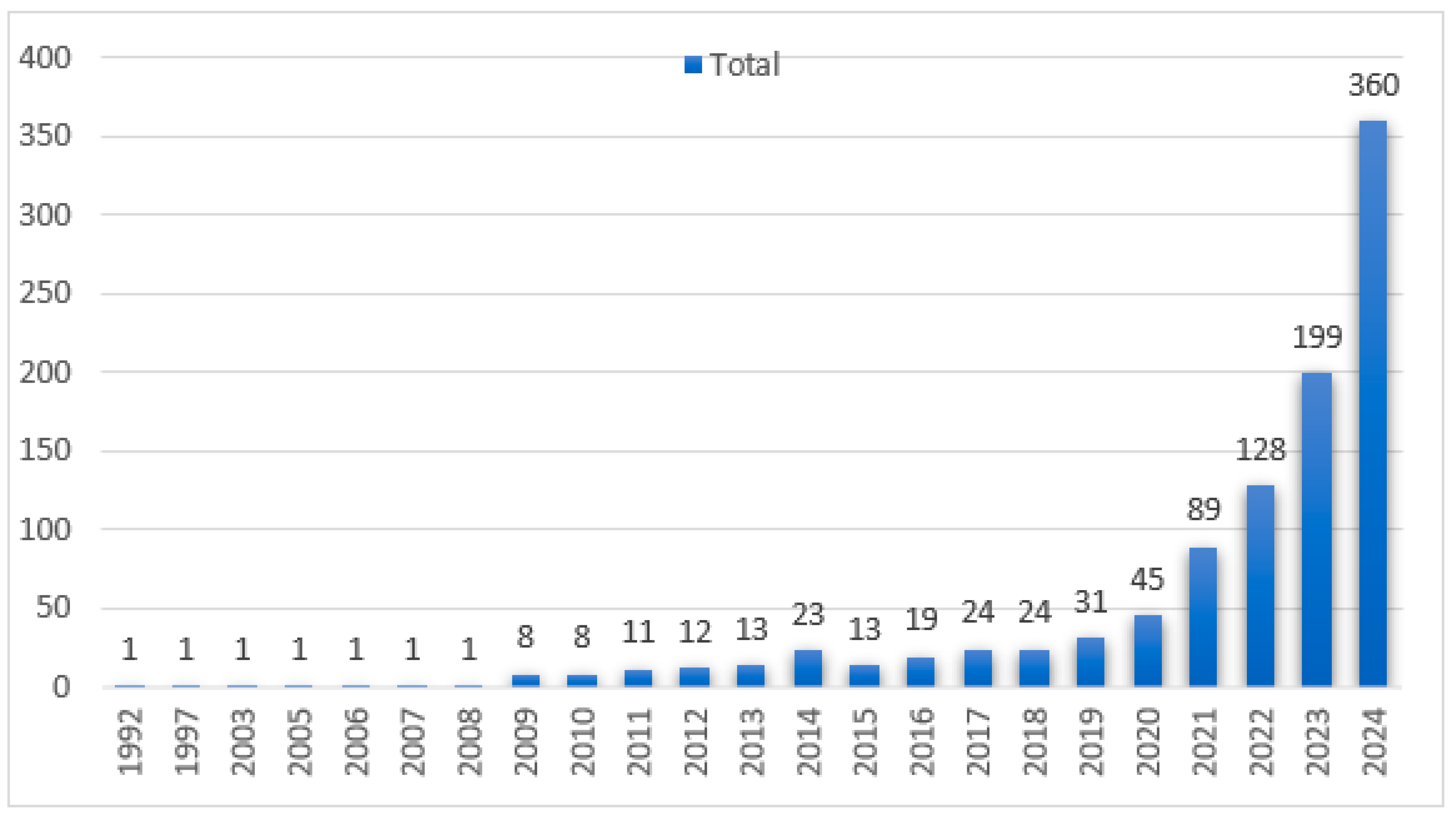
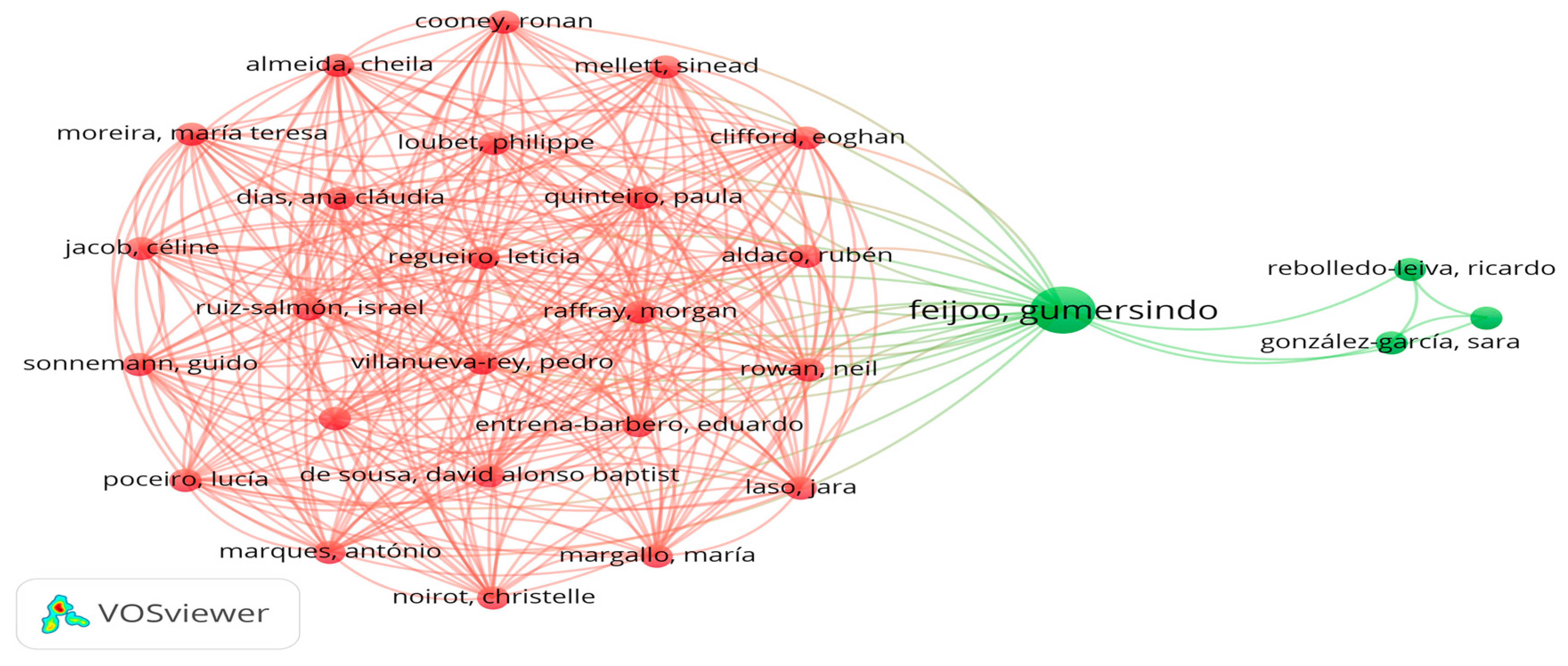
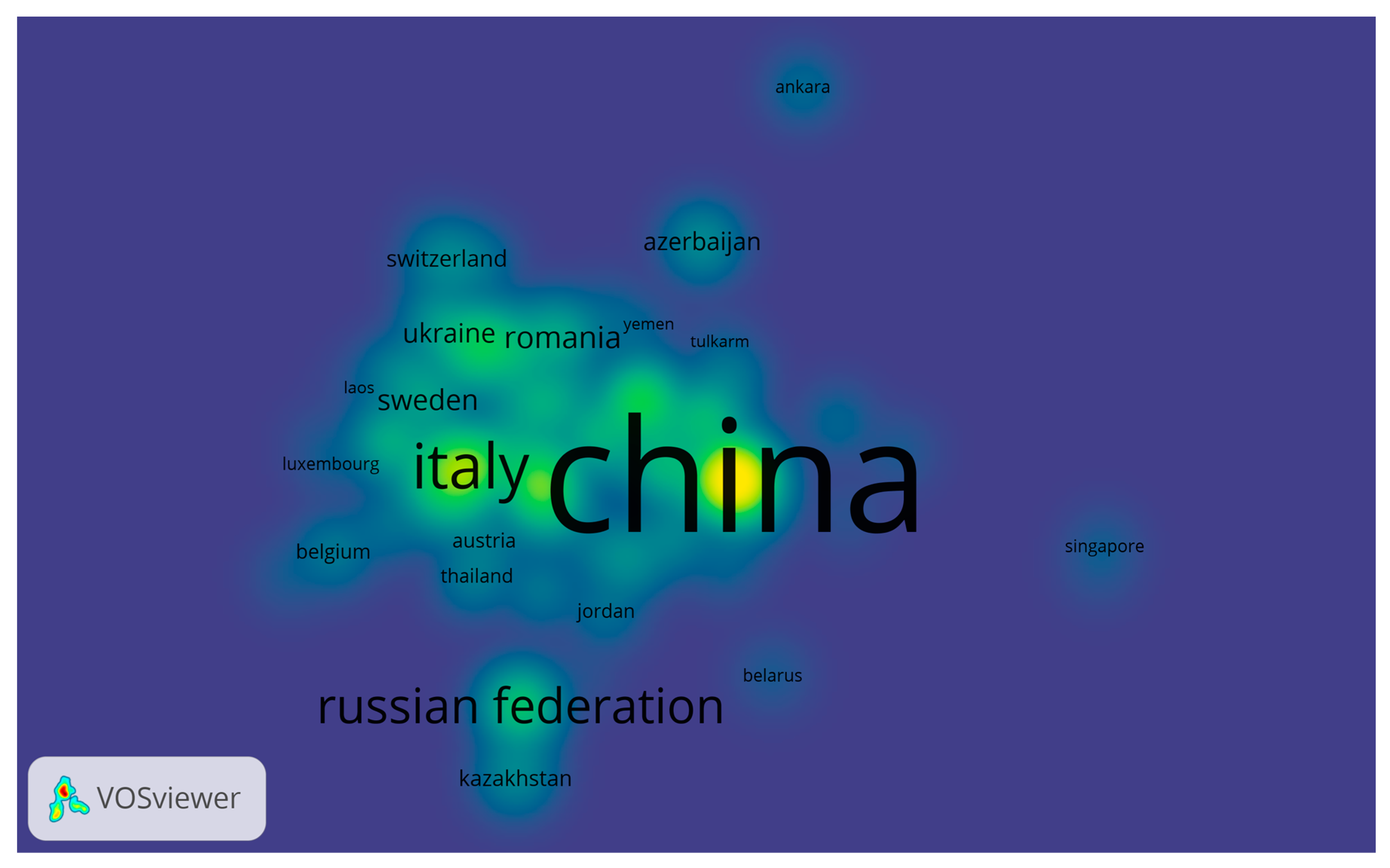
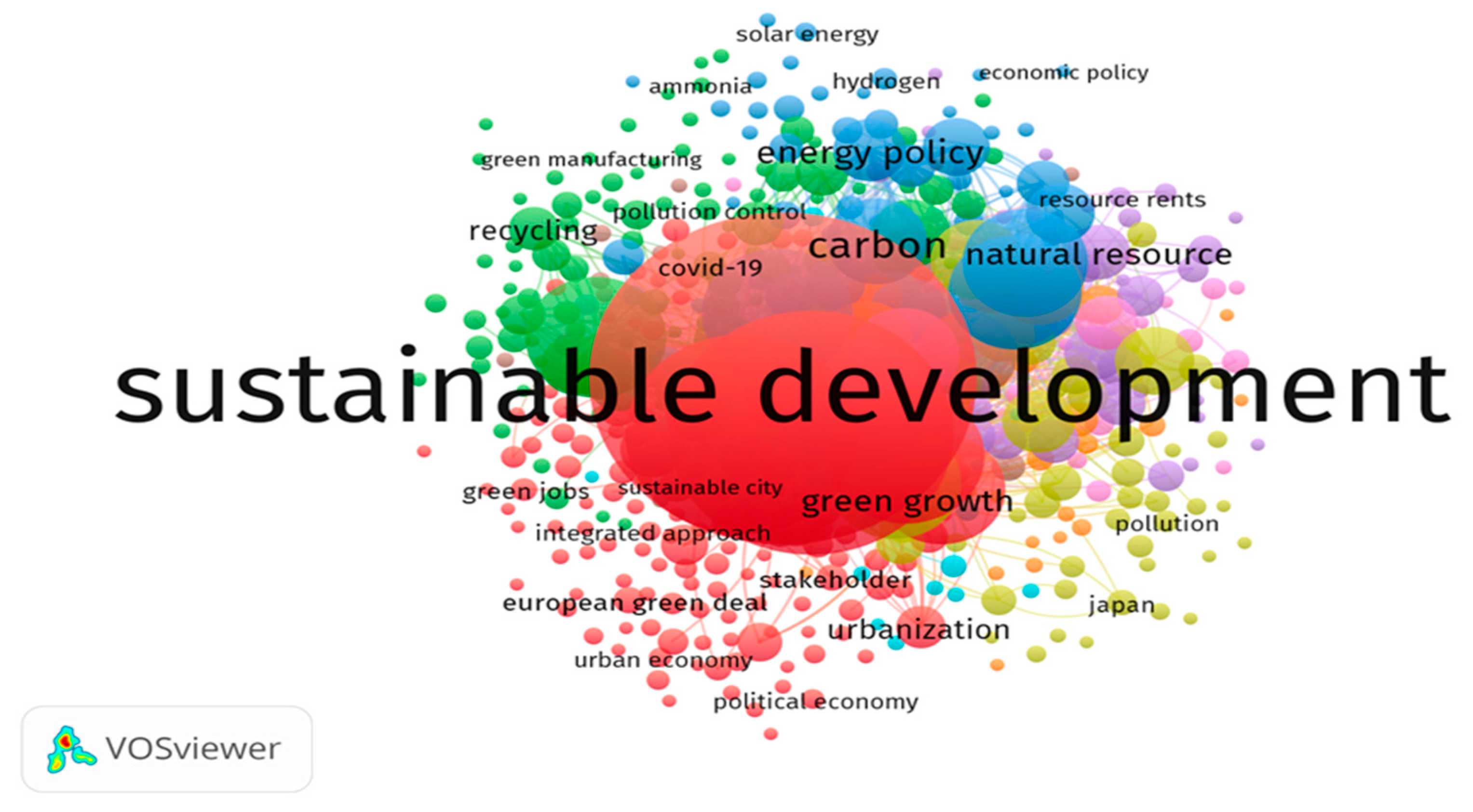
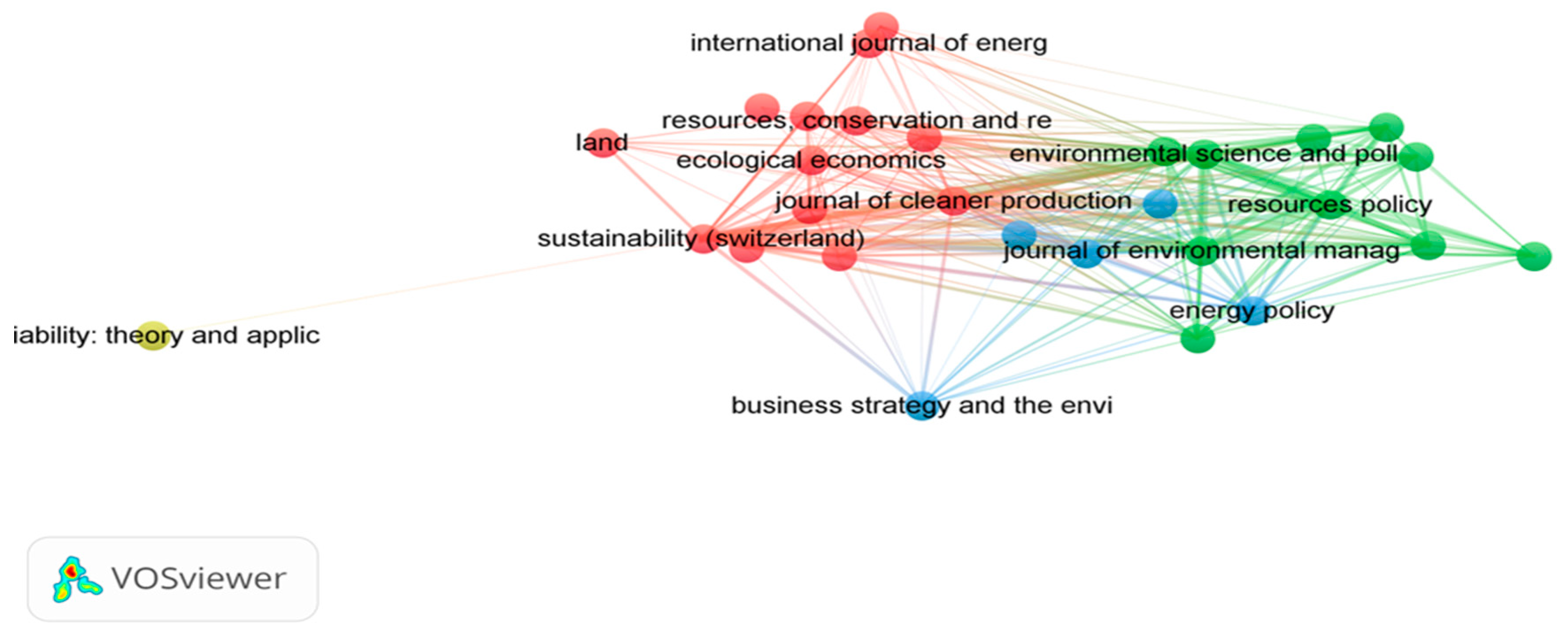
| Country | Number of Co-Authors | Country | Number of Co-Authors | Country | Number of Co-Authors |
|---|---|---|---|---|---|
| China | 600 | Italy | 269 | Russian Federation | 172 |
| United Kingdom | 141 | India | 139 | Spain | 104 |
| United States | 102 | Germany | 89 | Brazil | 72 |
| Romania | 72 | Ukraine | 73 | Pakistan | 69 |
| Poland | 59 | Turkey | 56 | Australia | 53 |
| Kazakhstan | 50 | Vietnam | 50 | Sweden | 47 |
| Indonesia | 44 | France | 43 | South Africa | 42 |
| Norway | 39 | The Netherlands | 36 | Malaysia | 36 |
| Saudi Arabia | 32 | Hungary | 31 | Switzerland | 29 |
| Denmark | 28 | Greece | 27 | Finland | 26 |
| Japan | 25 | Canada | 24 | South Korea | 24 |
| Portugal | 23 | Nigeria | 22 | Taiwan | 22 |
| Tunisia | 22 | Ireland | 20 | Latvia | 19 |
| Serbia | 18 | Croatia | 17 | Lithuania | 16 |
| Azerbaijan | 16 | Hong Kong | 14 | Austria | 14 |
| Mexico | 14 | Belgium | 13 | Kyrgyzstan | 11 |
| Ghana | 13 | Argentina | 11 | Bangladesh | 11 |
| Uzbekistan | 11 | Slovenia | 10 | Morocco | 10 |
| Bulgaria | 10 | Slovakia | 9 | Thailand | 9 |
| Iran | 9 | Ethiopia | 7 | Czech Republic | 6 |
| Jordan | 8 | Peru | 7 | Belarus | 5 |
| Estonia | 8 | United Arab Emirates | 7 | Bahrain | 5 |
| Cyprus | 8 | Chile | 6 | Philippines | 5 |
| North Macedonia | 8 | Lebanon | 6 | Qatar | 5 |
| Bosnia and Herzegovina | 4 | Central African Republic | 3 | New Zealand | 3 |
| Montenegro | 4 | India | 3 | Iceland | 3 |
| Togo | 4 | Cuba | 3 | Luxembourg | 3 |
| Sakarya | 3 | Armenia | 3 | Myanmar | 3 |
| Namibia | 3 | Kenya | 1 | Serdiva | 1 |
| Laos | 2 | Costa Rica | 1 | Tanzania | 1 |
| Iraq | 2 | Sweden | 1 | Botswana | 1 |
| Colombia | 2 | Zambia | 1 | Kuwait | 1 |
| Trinidad and Tobago | 2 | Poland | 1 | Damascus | 1 |
| Singapore | 2 | Pakistan | 1 | Oman | 1 |
| Egypt | 2 | Sri Lanka | 1 | Yemen | 1 |
| Georgia | 2 | Tulkarm | 1 | Brunei Darus- salam | 1 |
| Ecuador | Tajikistan | Maldives | 1 | ||
| Ankara | 1 | Madagascar | 1 | Djibouti | 1 |
| Benin | 1 | - | - | - | - |
| Author | Documents | Citations | Total Link Strength | Rank |
|---|---|---|---|---|
| Mahmood, Haider | 4 | 497 | 1 | 1 |
| Iraldo, Fabio | 4 | 311 | 0 | 2 |
| Ahmed, Zahoor | 4 | 272 | 1 | 3 |
| Morone, Piergiuseppe | 4 | 233 | 1 | 4 |
| Murshed, Muntasir | 4 | 210 | 1 | 5 |
| Passaro, Renato | 6 | 210 | 1 | 6 |
| Gyamfi, Bright Akwasi | 5 | 209 | 2 | 7 |
| Shahbaz, Muhammad | 4 | 205 | 0 | 8 |
| Bashir, Muhammad Farhan | 4 | 114 | 0 | 9 |
| Sharif, Arshian | 4 | 99 | 0 | 10 |
| Wang, Ying | 4 | 78 | 0 | 11 |
Disclaimer/Publisher’s Note: The statements, opinions and data contained in all publications are solely those of the individual author(s) and contributor(s) and not of MDPI and/or the editor(s). MDPI and/or the editor(s) disclaim responsibility for any injury to people or property resulting from any ideas, methods, instructions or products referred to in the content. |
© 2025 by the authors. Licensee MDPI, Basel, Switzerland. This article is an open access article distributed under the terms and conditions of the Creative Commons Attribution (CC BY) license (https://creativecommons.org/licenses/by/4.0/).
Share and Cite
Valache-Dărîngă, A.-A.; Ciurea, M.; Popescu, M. A Bibliometric Perspective of the Green Transition Within the Framework of Sustainable Development. World 2025, 6, 140. https://doi.org/10.3390/world6040140
Valache-Dărîngă A-A, Ciurea M, Popescu M. A Bibliometric Perspective of the Green Transition Within the Framework of Sustainable Development. World. 2025; 6(4):140. https://doi.org/10.3390/world6040140
Chicago/Turabian StyleValache-Dărîngă, Angela-Alexandra, Maria Ciurea, and Mirela Popescu. 2025. "A Bibliometric Perspective of the Green Transition Within the Framework of Sustainable Development" World 6, no. 4: 140. https://doi.org/10.3390/world6040140
APA StyleValache-Dărîngă, A.-A., Ciurea, M., & Popescu, M. (2025). A Bibliometric Perspective of the Green Transition Within the Framework of Sustainable Development. World, 6(4), 140. https://doi.org/10.3390/world6040140









